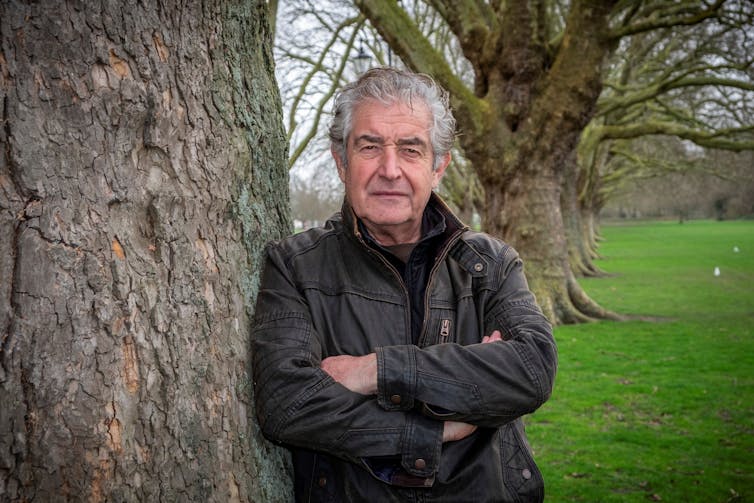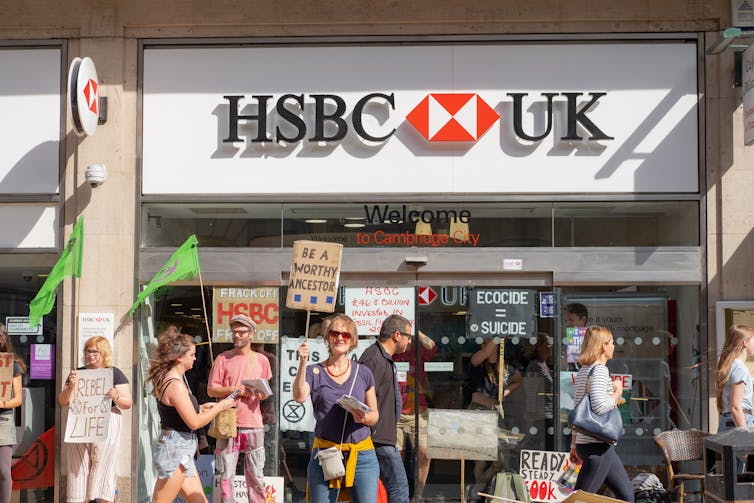
Jason Bye, CC BY-NC-ND
Inequality – between the rich and poor or between the powerful and the weak – is the main factor stalling action on environmental problems including biodiversity loss, pollution and climate change, according to British environmentalist Tony Juniper.
In his new book, Just Earth: How a Fairer World Will Save the Planet, he argues that “if we want to build a secure future, both environmental priorities and social justice must be pursued together”. Much of this is about how decisions are made: “Disadvantaged groups rarely have a say, while those deciding on policy continue to comprise a narrow social segment.”
It is interesting to see Juniper’s views on the topic of a just transition, given his decades of experience. Juniper has served as the executive director of environmental charity Friends of the Earth, he was a Green party parliamentary candidate in the 2011 general election and previously led The Wildlife Trusts. He is currently chair of Natural England, the official government organisation working for the conservation and restoration of the natural environment.
His views on this subject certainly matter. His key message that social justice is at the heart of solving environmental problems helps to explain why we have collectively failed to address these.
This injustice is an issue that has been raised for decades by those most affected by environmental issues, those who work in the environment sector and academics like me who focus on environmental justice.
The UK environment sector, for example, is notoriously one of the least diverse, with only 3.5% of those working in environmental jobs identifying as an ethnic minority. In addition, the climate change movement is sometimes portrayed by the media as a middle-class preoccupation. Research shows a tendency for mainstream media to position environmentalism as a position of the wealthy. That’s reflected by the use of distancing terminology such as “middle-class tree huggers”.
However, 39% of UK working class voters experience climate anxiety. That’s only slightly below the 42% of middle-class voters.
Levels of climate concern have stayed high throughout both the COVID-19 pandemic and cost of living crises, while support for government action on climate mitigation policies, such as decreased meat consumption and flying, has remained steady.
At the global level, there have always been tensions between developed and developing countries in terms of what is “fair”. Entrenched power dynamics ensure that developed countries have historically won out when deciding what a fair future looks like.
Most recently, those tensions have been evident in the lack of clarity around how loss and damage will be funded and managed – who will pay out when an island disappears, or a village becomes inhabitable to due drought, for example? There’s also much debate around how a new finance goal should be defined, with huge disagreements between the developed and developing countries.
As Juniper explains, not only is it unclear what fairness means at global negotiations, there is clear evidence that these tend to favour the more powerful countries, such as the US or members of the EU, and create an unjust regime. Steven Vanderheiden, one of the earliest climate justice philosophers, claims that developing nations are usually offered a “take it or leave it” deal, such as the new finance goal of US$300 billion (£232 billion) or about half of what developing countries were asking for, once developed nations have made decisions without them.
A fairer vision
In response to these inequalities and ongoing tensions, Juniper sets out a vision for a fairer, greener society – also known as a just transition.
A just transition is hard to define. It was once a relatively well demarcated and clearly grounded concept associated with worker’s rights.
Over time, it has become an increasingly all-encompassing policy objective, untethered from any specific policies, political objectives or priorities. Indeed, while there are certainly overlaps between the different visions of a just transition, significant aspects directly contradict one another.

CC BY-NC-ND
Many of the messages in Juniper’s book have been shouted by those less privileged for decades. By using his platform to amplify the importance of climate justice, he is striving to make a difference. However, the voices of those from affected communities in developing countries, the working class in richer countries, and women (who will be hardest hit by climate change) are somewhat absent.
Juniper neatly encompasses 40-plus years of global negotiations on climate change and biodiversity, reflecting on core issues blocking progress, such as populism and fossil fuel interests. Getting your head around negotiations is a complex task – and it’s one that Juniper executes very well.
Juniper also discusses rising inequality, especially post-COVID, and the intersecting relationship between affluence and environmental destruction, with the richest consuming far more than the poorest and the top 10% wealthiest individuals having emitting more greenhouse gases than the poorest 50%.
He sets out the impacts of consumption, particularly of the wealthiest, and the unfairness of those being hit hardest consuming the least. He carefully dissects why indefinite growth of GDP can no longer be taken as a given.
Then he sets out his vision for a just transition with a ten-point agenda, including new measures of progress. He suggests focusing on wellbeing and sustainable consumption, not GDP.
He highlights the importance of financing the future and raising the transition war chest – that involves carbon tax regimes and additional public resources for environmental protection to build climate resilience. He advises switching subsidies to green energy rather than fossil fuels, and also advocates for the use of ecocide law to protect future generations.
While progress is possible, Juniper is a realist. He outlines how much our culture needs to shift away from consumption, competition, devaluing nature, and towards a fairer society for all. As he puts it: “We have nowhere else to go. There is just Earth.”
——————————————-
This blog is written by Dr Alix Dietzel, Senior Lecturer in Climate Justice, University of Bristol Cabot Institute for the Environment. This article is republished from The Conversation under a Creative Commons license. Read the original article.




